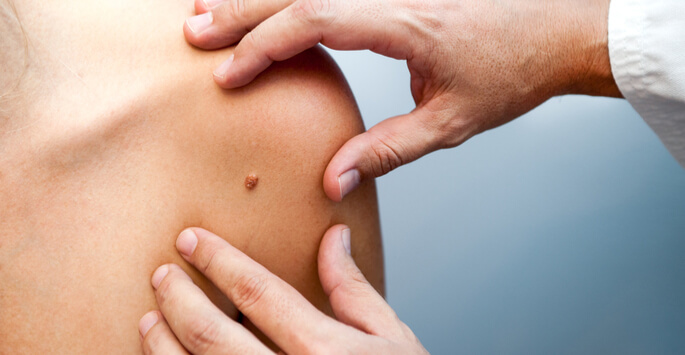The idea that you could have skin cancer at this very moment and not realize it is intimidating to most people. The fact is that cancer can impact any one of us. There are some who are more at risk based on genetic or lifestyle factors, but skin cancer does not discriminate. It helps to know some of the things to look for when you do a skin cancer self-exam.
The United States sees approximately 23,000 diagnoses of malignant melanoma each year. The lifetime risk of developing this particular cancer has grown from 1:1500 in 1930 to 1:150 today. Even one serious sunburn can double an individual’s chances of having malignant melanoma later in life. If you discover a new mole somewhere on your body, it may be a sign of this cancer. We advise you to be wary of what we call the ABCDEs of malignant melanoma:
- Asymmetry – if you drew a line down the middle of the mole, both sides would not match
- Border – malignant melanomas often have rough edges as opposed to smooth borders
- Color – Benign moles are typically one color, but malignant ones are usually black and brown and can also be blue and white.
- Diameter – Melanomas are conventionally larger than other moles, which are about 6 millimeters or smaller.
- Evolution – Be vigilant of changes in color, shape, and/or size of a mole, as well as symptoms such as itching, tenderness, and/or bleeding.
Aside from malignant melanoma, we also advise you be on the lookout for warning signs of basal and squamous cell carcinoma. After skin cancer has been officially diagnosed, we treat different varieties with a variety of options:
- Squamous cell carcinoma gets treated with removal
- Basal cell carcinoma usually receives curettage and electrodessication, radiation therapy, cryotherapy, or total removal.
- Melanomas receive removal, lymph node dissection when necessary, and potentially immunotherapy and chemotherapy.
- Moh’s micrographic surgery is used to treat recurring tumors in difficult locations
- Experimental and alternative methods entail dietary supplementation with beta-carotene and vitamins, immune system stimulants, and low-dose retinoids.
If you think you may have skin cancer, please don’t hesitate to get in touch and make an appointment with the office of Boulder Plastic Surgery. At our convenient location in Boulder, our friendly team of dedicated professionals will be happy to provide you a thorough examination, explain your options in full, and address any questions and concerns you may have. Contact us today to set up your consultation!
